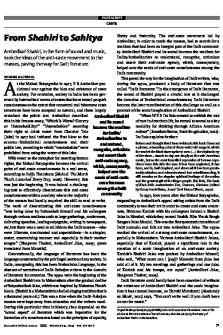From Mendel to Epigenetics: History of Genetics PDF

| Title | From Mendel to Epigenetics: History of Genetics |
|---|---|
| Author | Vann Encoy |
| Course | BSBiology |
| Institution | Leyte Normal University |
| Pages | 2 |
| File Size | 82.6 KB |
| File Type | |
| Total Downloads | 17 |
| Total Views | 156 |
Summary
Insight paper...
Description
From Mendel to Epigenetics: History of Genetics Summary The history of genetics could be placed in this order: Mendelian genetics, classical genetics and then molecular biology. Mendelian genetics started with Gregpr Mendel when he experimented on peas in 1865 and the rediscovery of his work by de Vries, Correns and Tschermak in 1900. However, the term ‘genetics’ did not exist until William Bateson coined it in 1906 to designate the new science of heredity. Around 1908, Thomas Hunt Morgan and his colleagues ventured into the study of heredity and experimented on fruit flies using both Mendelian genetics and the chromosomal theory of inheritance proposed by Walter Sutton and Theodor Boveri in 1902. The fusion produced great results being able to explain better Mendel’s laws and marking the beginning of classical genetics. In the mid-1930s, genetics was sub-divided into three major sub-disciplines namely formal genetics proper, population genetics and physiological genetics. The discovery of the double helix structure of DNA paved the way to consecutive discoveries in molecular biology which greatly affects the concept of gene. It seemed hopeless to come up with a general definition for the term ‘gene’ in the molecular aspect. It has also been said by others that genetics may be completely wiped out by molecular biology. But like other fields of science, genetics will always be around depending on the scientific context.
Insight/ Reflection It is quite fascinating how one thing could lead to something great especially when it wasn’t even intentional. Unfortunately, he wasn’t able to feel the greatness of his discovery because he was already dead when he was rightfully recognized as the founder of genetics. If it wasn’t for his curiosity, I’m pretty we won’t even know that he exists and genetics would be younger than 150 years. The concept of gene is what I find the most interesting in this article even though its coverage is not even half the paper. Through most of the article, ‘gene’ was defined using many terms and combination of words: unit of recombination, unit of mutation, a protein, an aperiodic
crystal, sequences of nucleotides, a cistron and so much more. It made me question if there is a ‘gene’ because what if the things they are calling ‘gene’ is something else that is already known but only of a different variety, category, specie or whatever. These scientists work in different environments, have different fields and it seems that they are defining the term in their own context which would definitely vary. I always thought there was no existing complication in the definition of this term, but then again, it is the essence of science. Someone will always be asking a whole of questions whether it is for or against the topic. Near the end of the paper, the author mentioned the “impending doom” that genetics could face in the future. “The findings of molecular biology have deeply altered the theoretical framework of genetics. Some authors claim that genetics has been ‘replaced’ by the concepts and methods of molecular biology…”. I personally think that molecular biology could never ‘replace’ genetics because it is not like the concepts and methods of molecular biology could disprove the existence of genetics. Instead, it reinforces it and the presence of molecular biology aids in genetics-related discoveries. Its theoretical framework, rather than being replaced, partially overlaps with molecular biology. An example of this are classical and relativistic concepts of physics. Although relativity explains a lot of things especially in space travel, classical concepts still proves useful in explaining basic and everyday activities. Therefore, the talk of the science of heredity depends on its scientific context.
Conclusion Although Mendel did not intend to pioneer the science of heredity, his contributions, which were initially ignored by the public, served as the foundation of genetics. In the 150 years of development, a lot has been discovered especially when molecular biology came into the picture but the talk on the concept of gene in the molecular aspect that seems to be a neverending endeavour to the geneticists who wish to give the term a general definition....
Similar Free PDFs

1-Mendel - mendel
- 42 Pages

Mendel
- 4 Pages

Epigenetics Stanford Coursera Notes
- 14 Pages

The Genetics of Parenthood
- 12 Pages

Dept of History Guide to referencing
- 12 Pages

Background to Caribbean History
- 26 Pages

From Shahiri to Sahitya
- 1 Pages

Genetics Penny Genetics
- 4 Pages

From Rhodes to Rome
- 6 Pages
Popular Institutions
- Tinajero National High School - Annex
- Politeknik Caltex Riau
- Yokohama City University
- SGT University
- University of Al-Qadisiyah
- Divine Word College of Vigan
- Techniek College Rotterdam
- Universidade de Santiago
- Universiti Teknologi MARA Cawangan Johor Kampus Pasir Gudang
- Poltekkes Kemenkes Yogyakarta
- Baguio City National High School
- Colegio san marcos
- preparatoria uno
- Centro de Bachillerato Tecnológico Industrial y de Servicios No. 107
- Dalian Maritime University
- Quang Trung Secondary School
- Colegio Tecnológico en Informática
- Corporación Regional de Educación Superior
- Grupo CEDVA
- Dar Al Uloom University
- Centro de Estudios Preuniversitarios de la Universidad Nacional de Ingeniería
- 上智大学
- Aakash International School, Nuna Majara
- San Felipe Neri Catholic School
- Kang Chiao International School - New Taipei City
- Misamis Occidental National High School
- Institución Educativa Escuela Normal Juan Ladrilleros
- Kolehiyo ng Pantukan
- Batanes State College
- Instituto Continental
- Sekolah Menengah Kejuruan Kesehatan Kaltara (Tarakan)
- Colegio de La Inmaculada Concepcion - Cebu






